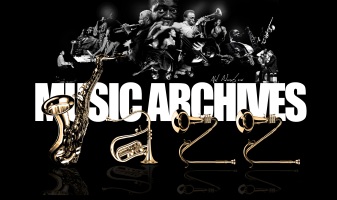Mike Gerber – Kosher Jammers – Jewish Connections in Jazz. Volume 1: The U.S.A.
(Vinyl Vanguard. Book review by Len Weinreich)

Some years ago, a London magazine commissioned a piece describing the Jewish contribution to jazz from journalist Mike Gerber. As he explains in the introduction to his new book, he diligently went in search of high quality leads, and rang Jim Godbolt, editor of the now defunct Jazz At Ronnie Scott’s house journal to enquire about whom he should interview (after all, Ronnie was notably Jewish). Initially, Godbolt’s reaction was sniffily dismissive until, on further consideration, he responded with a thunderously editorial: “What findings could possibly result from his investigations?”. This pompous question spurred Gerber to write ‘Kosher Jammers’, an absorbing account of how the children of Jewish immigrants took to jazz music (the title, ‘Kosher Jammers’ was lifted wholesale from Mickey Katz, a clarinettist who delighted 40s Borscht Belt customers with his unique cocktail of jazz, klezmer and Yiddish lyrics).
Professor Frederick Herzberg of Case Western Reserve University, a celebrated guru on the subject of motivation, once observed: “minority ethnic groups seeking acceptance in the host community generally advance through the entertainment industries”. For liberated black slaves in the U.S., the pace of acceptance was glacial, but progress was achieved through boxing, athletics, baseball, football and jazz. In the case of Jewish refugees who’d shlepped from Eastern Europe, it was somewhat faster, succeeding through musical theatre, film production and classical music. Oh, and jazz.
Dan Morgenstern, ex-editor of DownBeat magazine and former supremo at the Institute of Jazz Studies at Rutgers University, once explained to Gerber, that “jazz reflects the idea of America as a melting pot because minorities made such an enormous contribution to this music, coming out of an encounter between the African and the European… meaning Irish, Italian, Jewish and Spanish. If you look at jazz musicians, minorities really play a dominant role”. Furthermore, influential jazz critic Martin Williams observed: “I think it was a sociologist who did some kind of tabulation about the ethnic and national backgrounds of jazz musicians. Of course, Negroes were first. And I think the next were Jews, next Italians…”
Final comment on the subject goes to African American master drummer and ace talent-spotter Art Blakey, in whose considered opinion: “jazz is not African. It’s American”.
The earliest linking of Jews to jazz was in 1921 and, as might be expected, derogatory, having been scribbled in industrial strength bile by automotive tycoon and arch anti-Semite, Henry Ford, in his own Dearborn Gazette newspaper. Ford was protesting against the uncontrollable explosion of the music, pinning the blame firmly on the Jews. He jumped on the cultural bandwagon because jazz was big news. Hot licks were hot fashion and not for nothing were the 20s called ‘The Jazz Age’. Stimulated by ubiquitous phonograph records and new-fangled radio, the latest Jewish generation, born in the new world and eager to integrate as echt Americans, embraced jazz with enthusiasm.
Inevitably, discussing the development of jazz raises the subject of Race, never less than a touchy topic, especially in the U.S., where the linking of jazz and race can frequently be combustible. But it can also be constructive when one recalls that, in the 30s, it was two Jewish-led bandleaders who first breached the racial barriers and pioneered racial integration (preceding football, baseball and even the U.S. military). Sworn rivals Benny Goodman and Artie Shaw independently took momentous steps hiring African American musicians to work with their bands (Goodman, who’d already built his success on the arrangements of Fletcher Henderson, employed pianist Teddy Wilson and vibraphonist Lionel Hampton, later guitarist Charlie Christian and trumpeter Cootie Williams. Shaw engaged singer Billie Holiday and trumpeter Roy Eldridge). Fascinating sidelight: both Goodman and Shaw were among the most gifted clarinettists in jazz history. Perhaps there is an historical klezmer connection, but virtuoso Jewish clarinettists have maintained a special niche in jazz right up until today with Eddie Daniels and Anat Cohen.
In his determination to puncture what he perceived as Godbolt’s lofty indifference, Gerber has a tendency to over-present his argument, bombarding readers with information and facts when pauses for contemplation might have been in order. But his research has been industrious, crisscrossing the continent to interview many significant figures including the notoriously contradictory Artie Shaw. Gerber’s version of events is reasonably even-handed, exposing the villains and saluting the righteous because, among the many Jewish agents, record label proprietors, club owners and critics who formed the scaffolding of jazz, there was a scattering of scoundrels, many with links to the Mafia.
Some Jewish managers who handled even the most exalted Afro-American musicians were indistinguishable from mobsters, but possessing the ability and dubious contacts to navigate a bigoted landscape, they protected their clients in a hostile world. Louis Armstrong was managed by the imposingly scary Joe Glaser (a taciturn tough) until the end of his days and Duke Ellington by Irving Mills (canny, but tight-fisted), a relationship that ended abruptly with the death of Duke’s beloved mother, when the penny-pinching Mills ordered a cheaper coffin than Duke had specified.
But there were good guys, generally left-leaning, colour-blind menschen like Barney Josephson of Café Society, Max Gordon of the Village Vanguard and George Wein of Boston’s Storyville club (he also begat the Newport Jazz Festival) who operated legendary institutions where jazz talent was nurtured and respected. Norman Granz, once a card-carrying member of the Communist Party, started Jazz At The Philharmonic (JATP) concerts which became a lifesaver to many vintage jazz stars bypassed by fashion. And then there was producer Milt Gabler, who risked a massive gamble recording Billie Holiday’s ‘Strange Fruit’ after it had been cowardly rejected by her regular label, the mighty Columbia Records.
It was Buddy Rich, a drummer who happened to be Jewish, who first sparked Gerber’s interest in jazz. Rich was only one of a bunch of fine Jewish drummers which included Alvin Stoller, Tiny Kahn, Mel Lewis, Stan Levey and Shelly Manne. And there have been some star saxophonists like Stan Getz, Al Cohn, Lee Konitz, Paul Desmond (O.K. his mum wasn’t Jewish), Serge Chaloff and Steve Lacy. Plenty more where they came from. Choosing trumpeters, there were the tragically short-lived Sonny Berman, Ruby Braff, Jack Sheldon, Shorty Rogers, Red Rodney and Harry Aaron Finkelman (Ziggy Elman to you), the man who electrified a 1938 Carnegie Hall audience with an unabashed froelich chorus in the middle of ‘Bei Mir Bist Du Schoen’.
Gerber includes a chapter on how profoundly the Broadway stage influenced the development of jazz, particularly by Jewish composers like the Gershwins, Irving Berlin, Jerome Kern and numerous others like Johnny Green (composer of ‘Body And Soul’) whose work underpins so many jazz performances. He even reveals that Gershwin’s first musical was ‘Blue Monday’, written for an all-black cast with, as Afro-American critic Stanley Crouch wrote admiringly, “not a condescending note”. But inspiration flows in many directions and he neglects to note that key factors in the Jewish composers’ success were the powerful influences of ragtime and jazz, their fresh vigour and fascinating rhythms obliterating the outdated musical theatre conventions of Ruritanian schmaltz and waltzes.
Politically, there could have been more about the social, personal and musical relationships between Afro-American and Jewish musicians. ‘Kosher Jammers’ could have amplified the bohemian and socialist leanings of the early immigrants and how their underdog status manifested itself as sympathy and support for black causes, possibly explaining why courageous independent record companies like Blue Note, Prestige, Riverside, Verve, Fantasy and Contemporary, all with Jewish roots, were the predominant producers of black jazz.
The final chapter addresses klezmer music in the U.S. Not sure why. Given that klezmer’s influence in jazz history was miniscule, a footnote would have been sufficient.
LINKS: Kosher Jammers at Amazon / Paperback
Mike Gerber’s website
from https://londonjazznews.com






 Post Options
Post Options
 Thanks(0)
Thanks(0)
 Quote
Quote  Reply
Reply
 Topic: Mike Gerber – ‘Kosher Jammers – Jewish Connections
Topic: Mike Gerber – ‘Kosher Jammers – Jewish Connections

